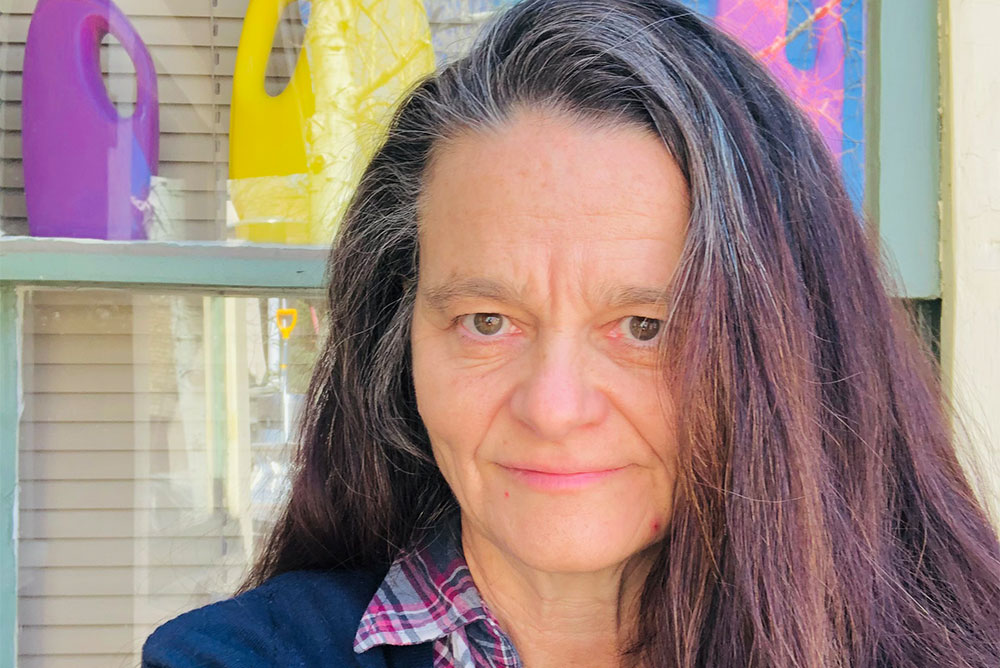
Courtesy of Connie Voisine.
Connie Voisine is Zócalo’s poetry editor, and the mastermind behind our 2022 Poetry Curator series, which features monthly takeovers of the poetry section by different guest curators. A professor of English at New Mexico State University, where she directs the creative writing program, she is also the author of several books of poems, most recently, The Bower. Voisine, who generously agreed to take part in the Zócalo poetry takeover as August curator, joined us in the green room to chat about her mystery-book-a-week diet, “solidly ordinary food” in Northern Ireland, and the most important year of her life.
What’s a poem that has influenced you or stayed with you?
Every time I read a George Herbert poem like “The Collar,” it always wakes me up with how diction and direct address is handled. I know that poem will rattle me into something.
How has the pandemic affected how you think about or write poetry?
Recently, [a fellow writer got me thinking] about T.S. Elliot’s “The Waste Land.” Going back to read it and seeing the kinds of despair in that poem [which was written after the 1918 flu epidemic] felt very powerful to me. I wrote a lot of despair poems during COVID—[now I’m thinking about] going back and revising my poems to what comes after despair. Beyond the despair and grief, what’s the next stage?
If you didn’t live in the United States, where would you live?
I have to make members of my family happy, so Ireland. I love it there, and they love it, too. But if I were a solo traveler, I probably would move every six months—six months in Rome, six months in France, and so on. I went to Rome for the first time in February, and by the time I left, I felt I wasn’t done with the city yet. Crossing the bridge over the Tiber, seeing the ruins of the theater where Julius Caesar was stabbed from our Airbnb room. [It gave me] goosebumps being a person inhabiting Western European literature—[this] idea of the classics being something that people walk by on their way to the donut shop.
What did you want to be when you were younger?
Someone like Carol Merrill…those people on game shows who demonstrated appliances and the brand-new cars.
What’s your guilty pleasure?
I’m very interested in mystery novels, and I read almost one a week. I decided not to feel too guilty about it. There’s so much available through genre now that is being taken seriously as a literary form, like sci-fi, fantasy, police procedurals—you can find some of the finest writings in those areas.
What was the most important year of your life?
When my daughter was born. I was sort of an older parent and was set in my ways in this artist’s mind and life. Having a child, nothing will be the same.
What food do you find irresistible?
Cooking itself is an escapist reality for me. I love that hour of the day where I get to make a meal. I recently watched Netflix’s Julie Child documentary and just seeing her engage with food and what it brought to her articulated a lot of feelings I had about food and cooking. As a child, I was a really fussy eater, but in some ways, I was developing this palate that was particular and acute.
What do you like to cook?
I don’t really know but we just got back from six months in Northern Ireland. Everything they have available there locally is just really good food. The whole island has learned to really use those ingredients. It was solidly ordinary food, but taste really good, so that’s what I’ve been thinking a lot about lately. What is the food that we eat here? People have a different idea of what their ordinary food is in America, because we have so much more access to different kinds of food, different cultures, traditions. What is ordinary to you, and how could it be made really delicious?
What’s one thing that surprised you on your travels to Ireland?
I’m always surprised at how much I thought we would be alike because we speak the same language and share a lot of the western European culture. But every time I go back, with my American relationship to English and their complex relationship with the English language and history, just listening to the language we share sort of retunes my ears.
What’s something in your house that you should throw out already but haven’t yet?
So many things! There’s a lot of spices I haven’t use, and you’re not supposed to keep them for years, but I can’t throw them away. There’s a lot of books that I probably should admit I’m never going to read. Even these shoes I brought back from Ireland—they’re beautiful, but have I worn them yet?



